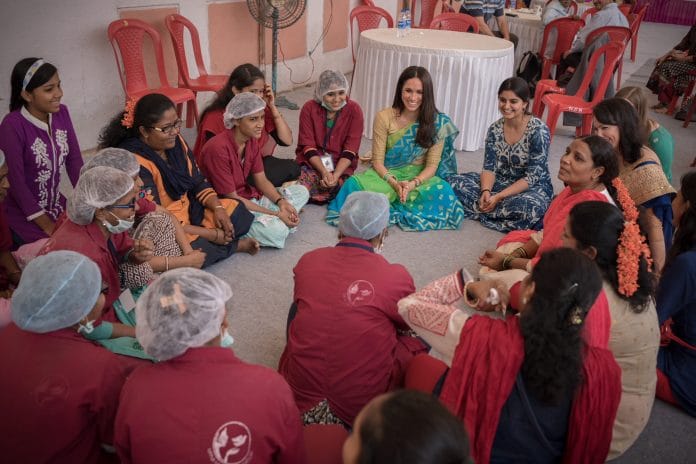The Myna Mahila Foundation is the only foreign organisation out of 7 that Prince Harry and Meghan Markle have chosen as recipients of charity at their wedding.
Mumbai: In 2015, Suhani Jalota, a student of Duke University, started the Myna Mahila Foundation in Mumbai to work on the issue of menstrual hygiene as part of an entrepreneurial fellowship. She was soon picked for the ‘college woman of the year’ award with nine students, each of whom were assigned mentors.
It was here that Jalota first met American actress Meghan Markle, who was someone else’s mentor, but took a keen interest in Jalota’s non-government organisation. Little did she know that the association would lead to her foundation, operating from a small space close to the Govandi slums in eastern Mumbai, to have a special status in Markle’s royal wedding to Prince Harry.

The NGO, which employs women living in Mumbai’s slums to manufacture sanitary napkins and sells them at affordable prices back in slums, is the only foreign charity in the list of seven organisations that Prince Harry and his bride-to-be have chosen as recipients of charity at their wedding. The couple has appealed to all their guests to donate to the chosen set of charitable organisations instead of having a gift registry.
“Not just for the royal couple, but the wedding has also turned out to be a fairytale come true for us,” Risha Rodrigues, an intern analyst at the foundation, told ThePrint a day before the wedding.
Founder Suhani Jalota, now 23, will attend the wedding at Windsor Castle on Saturday along with three other representatives of the Myna Mahila Foundation.
What Myna Mahila Foundation Does
The NGO employs 15 women, all from the slums in Govandi, to make sanitary napkins in a small facility that Jalota and her colleagues have created on the ground and first floors of a redeveloped building near the local slums. “We get all the raw material and the women manufacture and package the pads. The process involves 70 per cent work by hand and 30 per cent with the help of machines,” Rodrigues said.
A team of 50 women then distribute these sanitary napkins at a subsidised price to women living in at least 13 slum sprawls across the city, including Asia’s largest slum of Dharavi, hutments in Goregaon, Borivali, Aarey Colony, Govandi and so on. They also educate women on menstrual hygiene. Once every three months the foundation organises a health camp referring women to gynaecologists if required.
The NGO makes and distributes four types of sanitary napkins – regular, maternity pads, and pads in XL and XXL sizes. While the women at the Govandi facility make the regular and maternity pads themselves, the NGO has outsourced the manufacturing of the larger sizes to a factory in Surat, which makes them as per the foundation’s specifications. The products are priced as low as Rs 25 for a seven-pad packet of regular sanitary napkins.
As per the NGO’s research, about 320 million women in India do not have access to sanitary pads with menstruation being a taboo topic. There is also a certain stigma associated with buying sanitary pads from medical stores many of which have male shopkeepers. A number of women then rely on cloth rags. As per the Myna Mahila Foundation’s survey, only 2.3 per cent of women house cloth rags for menstruation disinfect them by washing these rags in hot water and soap and drying them in direct sunlight. The problem is especially acute in slums where houses are cramped and over-crowded. Due to the shame attached with menstruation, women end up hiding their rags in damp dark corners leading to a number of infections.
Incidentally, in January 2017, Markle visited the foundation and spent three days with the women working in the facility, getting to know the model and the operations better.
Future Plans
Twenty-three-year-old Sumati Joshi said, “Apart from the funds we receive as part of the charity, the biggest benefit that this opportunity has brought to us is the awareness that this has helped spread about the issue. Menstruation, a taboo subject, has now become a topic of drawing room discussion in many places.”
The foundation did not fill out any form or application and was surprised to receive official communication from England’s royal palace informing them about Prince Harry and Meghan Markle’s willingness to associate with the NGO. “It brought a sense of certification and validation for the work we are doing,” Joshi said.
Joshi, who will soon head the NGO’s operations branch, said the foundation is now focusing on ramping up a number of its other initiatives besides menstrual hygiene.
She said, “We started out with spreading awareness about menstruation hygiene and help women get access to sanitary pads because we thought that was a pressing issue. But we are now planning to work on a number of other initiatives too in parallel.”
For instance, the NGO is trying to get more women from slums in the formal employment sector by identifying specific business and employment opportunities for them and helping them prepare. Similarly, the organisation also plans to set up a child care centre in slum areas for women, who often don’t have any support systems, to be able to take up jobs without worrying about where to leave their children, Joshi said.






